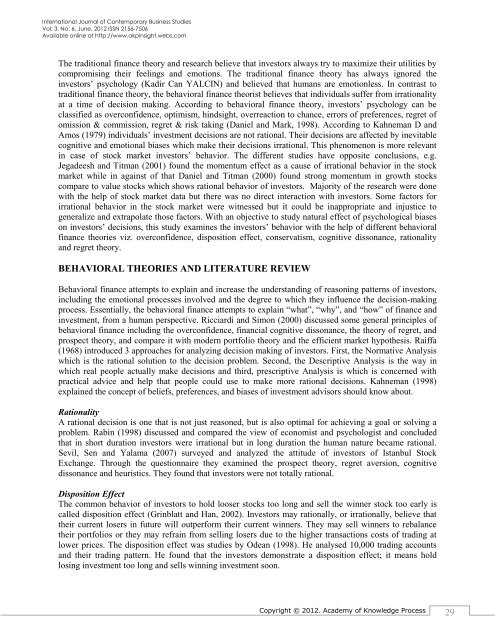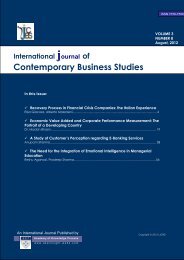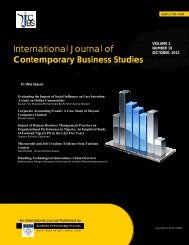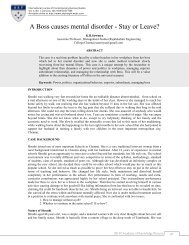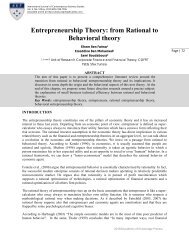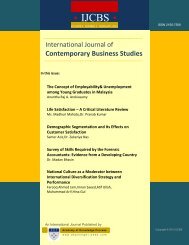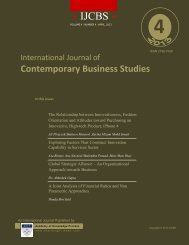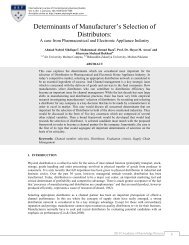International journal of Contemporary Business Studies
International journal of Contemporary Business Studies
International journal of Contemporary Business Studies
You also want an ePaper? Increase the reach of your titles
YUMPU automatically turns print PDFs into web optimized ePapers that Google loves.
<strong>International</strong> Journal <strong>of</strong> <strong>Contemporary</strong> <strong>Business</strong> <strong>Studies</strong><br />
Vol: 3, No: 6. June, 2012 ISSN 2156-7506<br />
Available online at http://www.akpinsight.webs.com<br />
The traditional finance theory and research believe that investors always try to maximize their utilities by<br />
compromising their feelings and emotions. The traditional finance theory has always ignored the<br />
investors‟ psychology (Kadir Can YALCIN) and believed that humans are emotionless. In contrast to<br />
traditional finance theory, the behavioral finance theorist believes that individuals suffer from irrationality<br />
at a time <strong>of</strong> decision making. According to behavioral finance theory, investors‟ psychology can be<br />
classified as overconfidence, optimism, hindsight, overreaction to chance, errors <strong>of</strong> preferences, regret <strong>of</strong><br />
omission & commission, regret & risk taking (Daniel and Mark, 1998). According to Kahneman D and<br />
Amos (1979) individuals‟ investment decisions are not rational. Their decisions are affected by inevitable<br />
cognitive and emotional biases which make their decisions irrational. This phenomenon is more relevant<br />
in case <strong>of</strong> stock market investors‟ behavior. The different studies have opposite conclusions, e.g.<br />
Jegadeesh and Titman (2001) found the momentum effect as a cause <strong>of</strong> irrational behavior in the stock<br />
market while in against <strong>of</strong> that Daniel and Titman (2000) found strong momentum in growth stocks<br />
compare to value stocks which shows rational behavior <strong>of</strong> investors. Majority <strong>of</strong> the research were done<br />
with the help <strong>of</strong> stock market data but there was no direct interaction with investors. Some factors for<br />
irrational behavior in the stock market were witnessed but it could be inappropriate and injustice to<br />
generalize and extrapolate those factors. With an objective to study natural effect <strong>of</strong> psychological biases<br />
on investors‟ decisions, this study examines the investors‟ behavior with the help <strong>of</strong> different behavioral<br />
finance theories viz. overconfidence, disposition effect, conservatism, cognitive dissonance, rationality<br />
and regret theory.<br />
BEHAVIORAL THEORIES AND LITERATURE REVIEW<br />
Behavioral finance attempts to explain and increase the understanding <strong>of</strong> reasoning patterns <strong>of</strong> investors,<br />
including the emotional processes involved and the degree to which they influence the decision-making<br />
process. Essentially, the behavioral finance attempts to explain “what”, “why”, and “how” <strong>of</strong> finance and<br />
investment, from a human perspective. Ricciardi and Simon (2000) discussed some general principles <strong>of</strong><br />
behavioral finance including the overconfidence, financial cognitive dissonance, the theory <strong>of</strong> regret, and<br />
prospect theory, and compare it with modern portfolio theory and the efficient market hypothesis. Raiffa<br />
(1968) introduced 3 approaches for analyzing decision making <strong>of</strong> investors. First, the Normative Analysis<br />
which is the rational solution to the decision problem. Second, the Descriptive Analysis is the way in<br />
which real people actually make decisions and third, prescriptive Analysis is which is concerned with<br />
practical advice and help that people could use to make more rational decisions. Kahneman (1998)<br />
explained the concept <strong>of</strong> beliefs, preferences, and biases <strong>of</strong> investment advisors should know about.<br />
Rationality<br />
A rational decision is one that is not just reasoned, but is also optimal for achieving a goal or solving a<br />
problem. Rabin (1998) discussed and compared the view <strong>of</strong> economist and psychologist and concluded<br />
that in short duration investors were irrational but in long duration the human nature became rational.<br />
Sevil, Sen and Yalama (2007) surveyed and analyzed the attitude <strong>of</strong> investors <strong>of</strong> Istanbul Stock<br />
Exchange. Through the questionnaire they examined the prospect theory, regret aversion, cognitive<br />
dissonance and heuristics. They found that investors were not totally rational.<br />
Disposition Effect<br />
The common behavior <strong>of</strong> investors to hold looser stocks too long and sell the winner stock too early is<br />
called disposition effect (Grinblatt and Han, 2002). Investors may rationally, or irrationally, believe that<br />
their current losers in future will outperform their current winners. They may sell winners to rebalance<br />
their portfolios or they may refrain from selling losers due to the higher transactions costs <strong>of</strong> trading at<br />
lower prices. The disposition effect was studies by Odean (1998). He analysed 10,000 trading accounts<br />
and their trading pattern. He found that the investors demonstrate a disposition effect; it means hold<br />
losing investment too long and sells winning investment soon.<br />
Copyright © 2012. Academy <strong>of</strong> Knowledge Process<br />
29


